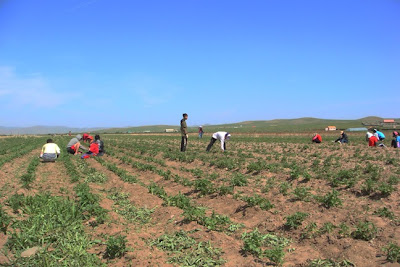Today was my first day working in the fields. This was my fifth day here, but I was cooking for two days and watering for one, and there was orientation the first day. So it was really only on the fifth day that I was truly working on the vegetable farm.
I was looking forward to it a lot. We were asked to weed the vegetables. We started walking out to the fields at 9 a.m. and probably started work at 9:15. As I took to my job, I dug out unwanted grasses. I don’t even know the name of the vegetable to which I was giving a helping hand. It didn’t look like a vegetable to me, but surely it must have been. It was somewhat recognizable because other members of the team had been working in the fields clearing weeds and unwanted plants.
The field was a rectangle, with lines and rows of small plants in between. So I went to the far end of the fields to start my work. Others had been assigned to a single row yesterday, and I had to start my own. Mostly I sat on the ground to dig, occasionally kneeling or squatting. It is a bit difficult to apply force when you are sitting on the ground.
 |
| Yours Truly, all covered up because of the Mongolian sun. |
 |
| One of the fields. |
 |
| Another field, this one potatoes. |
 |
| Sitting out the battle of weeds, in the carrot field. |
Before long, the kids came over to check me out. A moment later, one of them came to me with a spade and wanted to switch his tool with mine. He pretended to demonstrate to me how to use the tool, and then said, “Please,” but after trading tools, I realized that their spades were really not very good. But kids are kids, so I switched tools.
 |
| In the greenhouse, one of the kids, with a gardening tool. |
There I was, repeating the weeding motions—shoveling the earth, digging at the roots of the weeds, pulling them out, clearing the vegetable of the weeds surrounding it, and putting back some soil to provide a small row of higher soil for the vegetables.
My actions did not require deep thoughts and, as time went by, I started asking myself, what does all this mean to me? I am not working effectively. I don’t have strong arms, and my efforts seem so slow. I am working hard, but it is really not such hard labor and could easily be done by someone else. I don’t think that what I am going to do here in four weeks is going to change the local peoples’ lives, benefit the orphans, or change anything, for that matter. So what is the purpose of my volunteering here?
I became a bit sad. Maybe I and the other volunteers are just here for our own benefit—to get a glimpse of Mongolian life.
When I first checked the time, it was already 11 a.m. I considered the slowness of my work. The amount of labor that I put in would probably contribute only a little of the produce. The other day, I asked Sara the price of spring onions. She told me that a bunch costs only 500 tugrik (Mongolian money). I am unable to see the fruit of my labors, and this makes me somewhat uneasy.
As a city dweller, an educated person, I need to see results. It is something that has been internalized by us city people. I need to find meaning in what I do. In our education, in our lives, we often ask or are asked for the meanings of our actions. We tend to think that having a sense of purpose enriches our lives. We teach ourselves and our young to be reflective. We aspire to be thoughtful individuals. But do we really need meaning in everything we do?
 |
| Yours Truly, with Senior Baatar. |
While we were working, a man whom we called Senior Baatar walked by. (Baatar is a common name in Mongolia. There is Baatar, the head of the Mongolian Workcamp Exchange, and also another Baatar who looks after the farm in Bugus River, where the camp is, year round.) He was holding a small child on his shoulders, probably 2 or 3 years old. He said a few words to us, and then continued on his way somewhere with the baby. I thought to myself, does Baatar ask for meaning in his actions? Do we attach the same meaning to the word “meaning?” Does it really matter if we just live our lives without worrying too much about the meaning of things?














